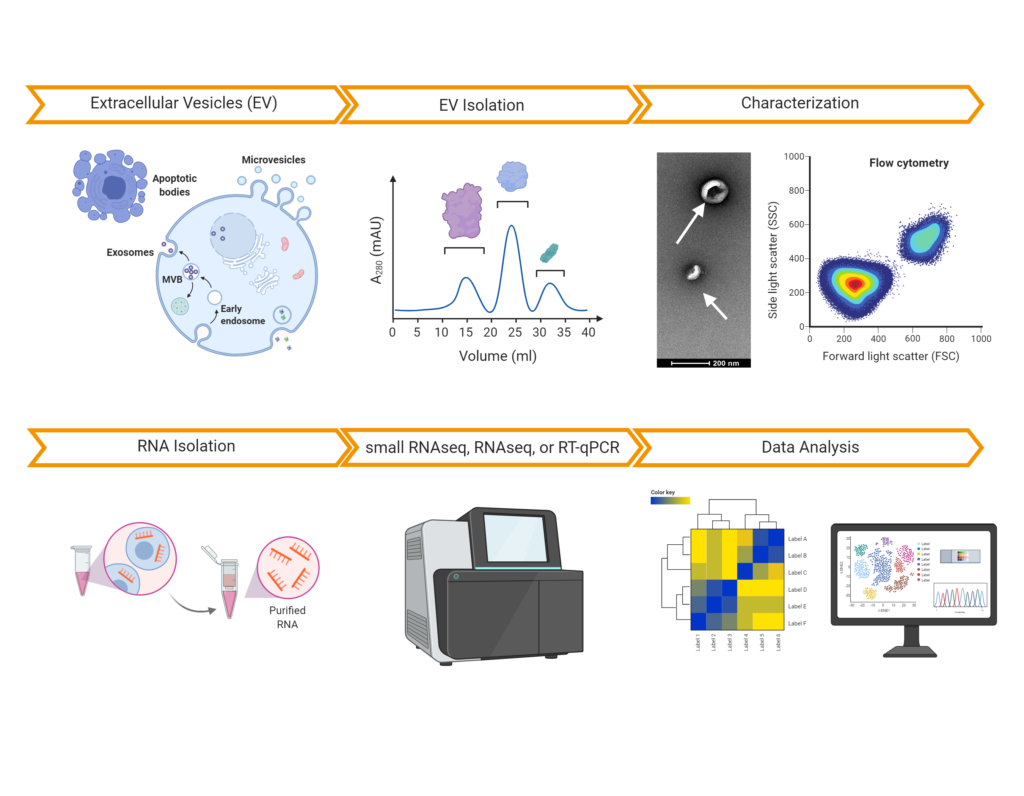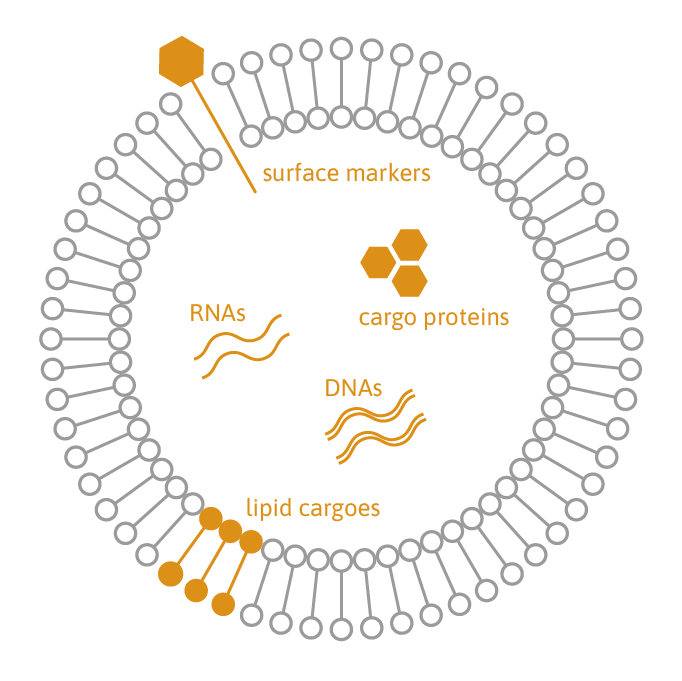One-stop-shop characterization of extracellular vesicles (EVs) and exosomes
Due to their capacity to transport proteins, lipids, and RNA/DNA, EVs play an essential role in cellular communication and are used as drug and biomarker candidates in regenerative and transplant medicine, anti-tumor therapy, and immunotherapy. TAmiRNA provides one-stop-shop services for the purification and multi-omic characterization of EVs. We provide assays to analyze EV concentrations, size, and cargo including nucleic acids (RNA/DNA), proteins, and lipids. Our unique small RNA sequencing protocol provides absolute numbers of RNA molecules inside EVs based on proprietary miND spike-in controls. All our services are based on best practices released by the International Society for Extracellular Vesicles (ISEV).
Our EV services:
- EV/exosome purification from plasma, serum, urine, other biological matrices (e.g. stool), or conditioned cell culture media.
- Immunocapturing of EV populations based on surface markers.
- EV characterization (NTA, flow cytometry, and electron microscopy).
- RNA-sequencing analysis of microRNAs, other small RNAs, or messenger RNA (mRNA) using miND® spike-ins.
benefits
EV purification: enrichment of EVs/exosomes can be performed using size exclusion chromatography (SEC), ultracentrifugation, and precipitation. SEC-based purification can deliver both EVs and protein complexes to study presence of RNA in both compartments in parallel.
EV characterization: we use Nanoparticle Tracking Analysis (NTA), cryo-electron microscopy, as well as multiplex flow cytometry to determine EV size, concentration, nucleic acid content (SYBR Gold), and surface epitopes (CD81, CD63, CD9). Upon request, we can develop assays for analyzing other surface epitopes.
Non-specific characterization of EV cargo: we apply highly sensitive methods for protein, dsDNA, and ssRNA quantification in EV preparations to characterize their protein and nucleic acid content. RNase/DNase/Protease treatments are used to reduce noise from surface decorations with RNA/DNA.
exRNA analysis in EVs: we have developed robust protocols for small RNAseq, RNAseq, and RT-qPCR analysis of EVs (and protein complexes) to perform highly quantitative analysis of microRNA, mRNA, and other non-coding RNAs.
Our experience: we have completed more small RNA sequencing analyses of > 500 EV samples obtained from various biological samples. We have developed surface epitope staining protocols and have established fluorescence-based techniques for staining intracellular RNA/DNA content using NTA Quatt analysis as a means of EV manufacturing quality control.
service requirements
We can purify EVs (and protein complexes) from
- biofluids such as (platelet-poor) plasma and urine,
- other biological matrices such as stool, synovial fluid, or milk,
- cell culture supernatant.
Sample volume is dependent on the type of biofluid, the required downstream analyses, and the concentration of EVs. Typically input volumes can be as low as 100 µl for plasma samples. Alternatively, we can process EV samples that have been generated by our customers as long as certain quality parameters can be assured. Get in touch with us to discuss your specific project details.
Comprehensive EVs characterization

extract of TAmiRNA’s project for characterization of EV RNA cargo
- small RNA sequencing-based characterization of microRNAs and other ncRNAs in EVs purified from synovial fluid and plasma
- SEC-purification of EVs and protein complexes from 28 human urine samples (following 10 kDa-UF) and small RNA sequencing analysis.
- small RNA sequencing-based characterization of MSC-derived EVs intended for pharmaceutical applications.
- Size, concentration, and nucleic acid cargo characterization of EVs obtained from various in-vitro models and using different isolation methods.
- Development of a flow-cytometry based protocol to characterize oncogenic protein surface markers on EVs
publications
Snorkel-tag based affinity chromatography for recombinant extracellular vesicle purification. Bobbili MR, Görgens A, Yan Y et al. J Extracell Vesicles. 2024 Oct;13(10):e12523. doi: 10.1002/jev2.12523.
Neuron-Derived Extracellular Vesicles miRNA Profiles Identify Children Who Experience Adverse Events after Ketamine Administration for Procedural Sedation. Lucaf M, Bidoli C, Franzin M et al. Clin Pharmacol Ther. 2024 Aug 20. doi: 10.1002/cpt.3420
Identification of miRNAs Present in Cell- and Plasma-Derived Extracellular Vesicles—Possible Biomarkers of Colorectal Cancer. Lenart M, Sieminska I, Szatanek R et al. Cancers (Basel). 2024 Jul 5;16(13):2464. doi: 10.3390/cancers16132464.
Analysis of extracellular vesicle microRNA profiles reveals distinct blood and lymphatic endothelial cell origins. Pultar M, Oesterreicher J, Hartmann J et al. J of Extracellular Bio.2024;3:e134; https://doi.org/10.1002/jex2.134
Independent human mesenchymal stromal cell-derived extracellular vesicle preparations differentially attenuate symptoms in an advanced murine graft-versus-host disease model. Madel RJ, Börger V, Dittrich R et al. Cytotherapy. 2023 Aug;25(8):821-836. doi: 10.1016/j.jcyt.2023.03.008. Epub 2023 Apr 12.
Circulating endothelial extracellular vesicle signatures correspond with ICU requirement: an exploratory study in COVID-19 patients. Zipperle J, Oesterreicher J, Hackl M et al. Intensive Care Med Exp. 2023 Nov 30;11(1):85. doi: 10.1186/s40635-023-00567-7
Exosomal miRNAs from Prostate Cancer Impair Osteoblast Function in Mice. Furesi G, de Jesus Domingues AM, Alexopoulou D et al. Int J Mol Sci. 2022 Jan 24;23(3):1285. doi: 10.3390/ijms23031285.
Small non-coding RNA landscape of extracellular vesicles from a post-traumatic model of equine osteoarthritis Anderson JR., Jacobsen S., Walters M. et al. Front. Vet. Sci., 08 August 2022, Sec. Veterinary Regenerative Medicine, https://doi.org/10.3389/fvets.2022.901269
Functional repertoire of EV-associated miRNA profiles after lipoprotein depletion via ultracentrifugation and size exclusion chromatography from autologous blood products Otahal A., Kuten‑Pella O., Kramer K et al. Scientific Reports Volume 11, Article number: 5823 (2021).
SVF-derived extracellular vesicles carry characteristic miRNAs in lipedema. Priglinger E., Strohmeier K., Weigl M et al. Sci Rep. 2020 Apr 29;10(1):7211.doi: 10.1038/s41598-020-64215-w.









